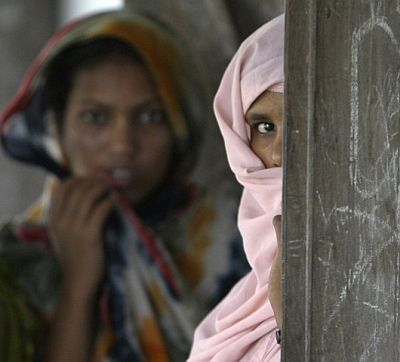 The incident became grist for media attention for people scanning 'cow' along with a Muslim name, regardless of the fact that in Manipur Muslims occupy a specific socio cultural and political positioning with the community having assimilated with the majority Meiteis, says Chitra Ahanthem.
The incident became grist for media attention for people scanning 'cow' along with a Muslim name, regardless of the fact that in Manipur Muslims occupy a specific socio cultural and political positioning with the community having assimilated with the majority Meiteis, says Chitra Ahanthem.
Most times, the mainstream media with great comfort stays away from considering unfolding events in the north eastern region of the country as 'non newsworthy.' But when a national newspaper says 'Headmaster Lynched for Stealing Cow; Shutdown Call in Manipur' (November 4) that went on to identify the deceased as a Muslim targeted by a Hindu, it brought on international media coverage with the headline 'Indian Muslim, Accused of Stealing a Cow, is Beaten to Death by a Hindu Mob' (November 5).
Given the national obsession over the status of the cow as food or as revered symbol, as a rallying point for a state election (with interesting results) and the cause of various incidents of violence and death, words like 'cow' and 'Muslim' were given a major spin and before one could say 'Holy Cow!' -- an incident of mob justice (something very common in Manipur) was not only given a communal tone but also tinged with the larger 'Hindu-Muslim' dynamics in the country.
Before we go into the larger issues of how the incident was being reported and why, here are the bare facts: The body of Mohammad Hashmad Ali alias Babu (55) was found before dawn broke out on November 2 presumably beaten up by a mob that collected when Khumallambam Brojen raised an alarm that the deceased was attempting to steal a calf.
The said incident became grist for media attention for people scanning 'cow' along with a Muslim name, regardless of the fact that in Manipur Muslims occupy a specific socio cultural and political positioning with the community having assimilated with the majority Meiteis.
This can be seen from the fact that there is a specific term by which the community is called in Manipur: Meitei Pangal (the word Pangal means Muslim). The only time there was a tear in the harmony between the Meities and the Meiti Pangals was in 1993 when riots broke out between the two communities in a specific location.
Incidentally, the Meities are ascribed as being Hindus but this is lazy assumption. The Meities had their own indigenous practices but were forcibly made to convert to Hinduism in 1717, when the then King Pamheiba of Manipur ordered that his subjects take to the new faith or be persecuted.
Over time, the Meiteis have taken to a synthesis of Hinduism and the earlier practices of the indigenous faith (Sanamahi) with deities of both tenets being placed in homes and dual festivals being celebrated.
For the current generation Meities, Hindusim is a small part of her/his identity with the main focus on one's ethnic and political identity.
Unfortunately, Hashmad Ali's death is 'just another' case of mob justice in a state where the state police department is not known for its ability of solving crimes or bringing culprits to book and where the public has taken to violence as a measure to be heard by the system.
This is seen in the phenomenon of joint action committees, which step in to gather support from various other local organisations and civil society groups.
Following Hashmad Ali's death, such a JAC (the Joint Action Committee against the Brutal Killing of Md. Hashmad Ali) was formed as a measure to seek justice for the former headmaster of an evening primary madrassa with neighbours and locals vouching for the integrity of the deceased.
Locals of Keirao Makting Awang Leikai, under the Irilbung police station in Imphal East where the deceased lived, are vehement that Hashmad Ali's lynching was a well-planned murder with the needle of suspicion being pointed towards a distant relative with whom there was an ongoing property feud.
JAC members along with members of other local organisations also vandalised the house of the relative and set it on fire. When the incident was 'dressed up' to look like a random case of mob justice, irate residents stormed the Irilbung police station, leaving many injured.
There are whispers that the police are sitting on the case due to 'political pressure' which may or may not be true in the back drop of a forthcoming bye-election.
Talking to this journalist over the phone, the late Hashmad Ali's son Mallik says he is "greatly disturbed" by the communal and political tones being given to his father's death. "All I want is justice for the death of my father and the police to clear his name. There is no need for politics to be played here," says Mallik who manages a BPO that takes up medical transcription.
Asked if he is aware about the mainstream media reporting of his father's death, Mallik said, "They should not write about things they do not know. Why are they now silent on the developments that are emerging now?"
Image published only for representational purposes.










